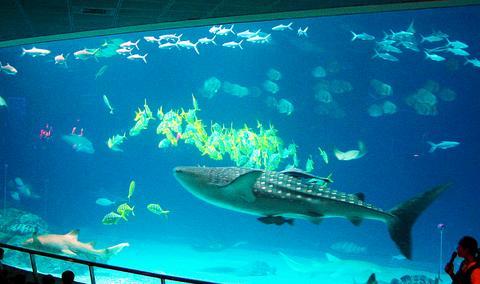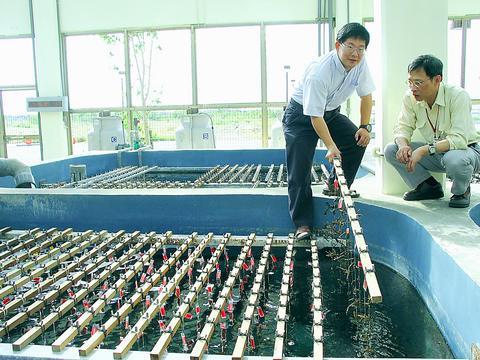Taiwan's eco-grid system has successfully extended its coverage from the land to the sea, further facilitating the sharing of the data contained in ecological studies with local scientists' counterparts in the rest of the world.
In Nanwan, a small bay north of the resort town of Kenting in southern Pingtung County, about 7m to 8m underneath a set of buoyant balls floating beside the Third Nuclear Power Plant's cold seawater intake system, a real-time set of monitors using nine sensitive cameras monitors marine ecological systems.

PHOTO: CHIU YU-TZU, TAIPEI TIMES
All data collected by the cameras is first digitized and then transmitted wirelessly to receivers in a control room at the power plant, through which it is then distributed via ADSL to the National Center for High-Performance Computing (NCHC).

PHOTO: CHIU YU-TZU, TAIPEI TIMES
"The underwater monitoring system in Nanwan functions 24 hours a day, seven days a week. Among the various researchers connected to the worldwide eco-grid, it's the first to be able to contribute data from under the sea," Lin Fang-pang (
Beginning last year, the center connected to the Pacific Rim Applications & Grid Middleware Assembly (PRAGMA), a unique collaboration among Asia-Pacific countries supported by the US National Science Foundation. Since then, Taiwan's eco-grid system powered by the center has become able to continuously contribute real-time ecological data collected by cameras on land at major research sites, including Fushan and Yuan Yang Lake in Ilan, as well as Nanjenshan in Pingtung, to the international community.
The center's first success in sharing long-term ecological research data with other countries last year served as an inspiration to local marine scientists. Devoted coral researchers wonder if the system could effectively help tackle problems about underwater observation of ecological systems.
In April, by working with local zoologists studying coral in waters managed by Kenting National Park, the center further built a real-time monitoring system near the power plant's intake of cold seawater.
According to Shao Kwang-tsao (
Shao said that continuous monitoring data collected at the site can offer more details about natural phenomena and the behavior of water creatures.
"In the past, we can only rely on diving to collect data. However, sensitive creatures might hide themselves," Shao said.
At a press conference held last week at the power plant, Shao showed real-time images of the underwater world in Nanwan, saying that researchers are learning more details about the competition between sea anemones and coral, the mechanism of coral's being covered by sediment, and other phenomena rarely observed.
However, maintenance is a headache. Every 7 to 10 days, biologists from the National Museum of Marine Biology and Aquarium, situated nearby, have to come to the plant to clean the cameras, whose lenses often become the home for tiny water creatures.
To facilitate a coral recovery project, Taiwan Power Company, which runs the plant, has also financed NT$6 million for the first two years of the project.
Shao said that inappropriate human activities at the national park had caused significant loss of biodiversity in recent decades.
"The government should zone more areas for ecological conservation here and limit fishing around coral reefs," Shao said.
Shao said that the abundance of ecological resources in Taiwan, whose geological and geographic conditions were formed as early as during the Tertiary period 65 million years ago, deserve to be studied more closely and preserved in order to ensure the land's sustainability.
The real-time underwater monitoring system now transfers images to the museum.
Fan Tung-yung (
"In addition to monitoring several coastal sites, we also grow as many kinds of coral colonies as we can in the lab," Fan said.
Results of their coral recovery efforts can be seen by museum tourists, who can enjoy the fascinating sight of diverse coral colonies and fish by walking into the display room called the "Kingdom of Coral."
Fan said that the museum promotes the preservation of not only coral but also other marine creatures. Although environmental education has been promoted for years, Fan remains worried. According to a newly completed investigation of ecological losses caused by an oil spill in 2001, the percentage of coral coverage in affected areas has dropped to 30 percent from 80 percent.
The spill involved a Greek-registered cargo ship, the MV Amorgos, which ran into submerged reefs near Kenting, leading to a spill of 1,150 tonnes of fuel oil near an ecological reserve at the park.
Being aware of the importance for Taiwan of promoting marine science-related research, NCHC director Joe Juang (
"In addition, if any lens for underwater cameras could be produced using nano-materials, the maintenance would be much easier," Juang said.
Grid computing requires powerful, reliable, high performance systems and sophisticated software.
So far, the underwater monitoring project involving grid technologies has interested other countries, such as Australia, whose ecological systems at the Great Barrier Reef are world-famous.
"The eco-grid system at Nanwan makes it possible for Taiwan to play a leading role in coral protection in the world," said Peter Arzberger, director of National Biomedical Computation Resource at University of California in San Diego.
The San Diego Supercomputer Center is one of the major webmasters maintaining the eco-grid. Through the connection, US scientists working on the establishment of a global lake observatory network now jointly monitor a site at Yuan Yang Lake in Ilan.
"By retrieving data collected in Taiwan, we can make a comparison between Yuan Yang Lake and others in the US," said Tim Kratz, director of Trout Lake Station at the Center for Limnology for the University of Wisconsin-Madison.
According to Kratz, Yuan Yang Lake is particularly interesting because of large disturbances caused by typhoons.
Kratz said that global perspectives are quite important for scientists because local environmental issues indicate global climate change.

US President Donald Trump said "it’s up to" Chinese President Xi Jinping (習近平) what China does on Taiwan, but that he would be "very unhappy" with a change in the "status quo," the New York Times said in an interview published yesterday. Xi "considers it to be a part of China, and that’s up to him what he’s going to be doing," Trump told the newspaper on Wednesday. "But I’ve expressed to him that I would be very unhappy if he did that, and I don’t think he’ll do that," he added. "I hope he doesn’t do that." Trump made the comments in

Japanese footwear brand Onitsuka Tiger today issued a public apology and said it has suspended an employee amid allegations that the staff member discriminated against a Vietnamese customer at its Taipei 101 store. Posting on the social media platform Threads yesterday, a user said that an employee at the store said that “those shoes are very expensive” when her friend, who is a migrant worker from Vietnam, asked for assistance. The employee then ignored her until she asked again, to which she replied: "We don't have a size 37." The post had amassed nearly 26,000 likes and 916 comments as of this

Tourism in Kenting fell to a historic low for the second consecutive year last year, impacting hotels and other local businesses that rely on a steady stream of domestic tourists, the latest data showed. A total of 2.139 million tourists visited Kenting last year, down slightly from 2.14 million in 2024, the data showed. The number of tourists who visited the national park on the Hengchun Peninsula peaked in 2015 at 8.37 million people. That number has been below 2.2 million for two years, although there was a spike in October last year due to multiple long weekends. The occupancy rate for hotels

A cold surge advisory was today issued for 18 cities and counties across Taiwan, with temperatures of below 10°C forecast during the day and into tonight, the Central Weather Administration (CWA) said. New Taipei City, Taipei, Taoyuan and Hsinchu, Miaoli and Yilan counties are expected to experience sustained temperatures of 10°C or lower, the CWA said. Temperatures are likely to temporarily drop below 10°C in most other areas, except Taitung, Pingtung, Penghu and Lienchiang (Matsu) counties, CWA data showed. The cold weather is being caused by a strong continental cold air mass, combined with radiative cooling, a process in which heat escapes from